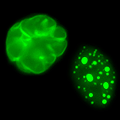This topic room focuses on mechanisms of disease. In doing so, it explores why some individuals are affected by specific conditions, such as polydactyly, spina bifida, and cancer. In addition, it discusses what scientists have done and what tools they have developed to investigate these conditions in the effort to better treat or prevent them. However, this topic room does not aim to provide information on every human disease. Rather, its goal is to cultivate interest and awareness of the complex relationship between human genetics and various disease states.
Based on their genetic contribution, human diseases can be classified as monogenic, chromosomal, or multifactorial. Monogenic diseases are caused by alterations in a single gene, and they segregate in families according to the traditional Mendelian principles of inheritance. Chromosomal diseases, as their name implies, are caused by alterations in chromosomes. For instance, within an individual's genome, some chromosomes may be missing, extra chromosome copies may be present, or certain portions of chromosomes may be deleted or duplicated. Finally, the vast majority of human diseases can be categorized as multifactorial. These conditions are also referred to as complex diseases, and they are responsible for most of the burden on our health care system. Examples of these conditions include cardiovascular disease, cancer, diabetes, and a number of birth defects and psychiatric disorders. By definition, complex diseases are caused by variation in many genes, and they may or may not be influenced by environment. Although common, these conditions present the biggest challenge to genetic researchers, and identifying the genes that contribute to these diseases has proven quite difficult. Beyond the aforementioned causes, a number of alternative genetic scenarios can also lead to disease; such scenarios fall under the umbrella of epigenetics.
One goal of genetic research is to better understand the mechanisms of disease so that new treatment approaches and preventative measures can be proposed. Technology has come a long way in this regard, and it is currently possible to simultaneously interrogate almost one million sites in any individual's genomic DNA with the goal of finding associations between a given disease and genetic variation. However, technological advances have also created new problems for scientists, such as how best to handle the millions of data points involved in genetic studies of disease. Mathematical and statistical models must be improved to accommodate the growing amount of data generated by today's research. Scientists must also continue to rethink clinical descriptions of disease. Because researchers now understand that the genetic contribution to many diseases is complex and that the same disease does not manifest in the same way in all people, descriptions that involve gradients of sickness and health are typically more effective than those that classify individuals as either "sick" or "healthy."
Understanding the role of genetics in disease has become a central part of medical research. Accordingly, this topic room aims to serve as a starting point for exploring this relatively new field of medicine.
Image: Brian C. Capell/National Human Genome Research Institute.













